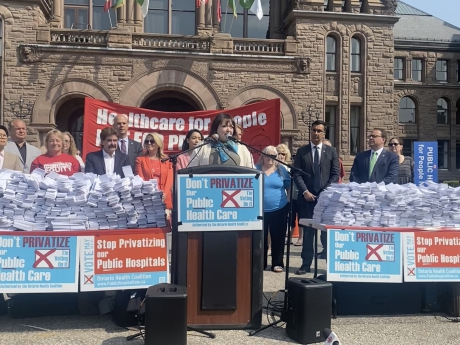Reports
You are here
Hundreds of thousands say no to Ford’s healthcare privatization

June 2, 2023
Across Ontario, more than 400,000 people voted in a people’s referendum on the question of privatizing healthcare. The vote was organized by the Ontario Health Coalition and saw an astounding number of people participate as volunteers and organizers.
There were advance polls at union conventions, on campuses and in neighbourhoods across the province. Those votes – along with online voting – had already topped 200,000 by the time the main voting days arrived.
On May 26 and 27, there were close to 1,000 polls in small towns and large cities. Workplaces, social agencies and community groups set up polling stations. There were ballot boxes in coffee shops at rural roadside stands and in parks.
It was a truly huge undertaking by the OHC but it also showed the breadth of opposition to the Ford agenda. The many thousands who participated were glad to have an opportunity to have a voice.
Ford has no mandate to privatize public services. He was elected with a measly 18% of eligible voters casting a ballot for the Tory party. During the election he didn’t once mention that he planned to transfer hospital services to private, for-profit entities. The anger on the streets towards his policies was palpable at the referendum polls.
The question is how to turn that anger into a movement. The hundreds of thousands who voted and the thousands who volunteered during the OHC campaign have been mobilized and have found common cause with neighbours and co-workers in this fight. The local health coalitions have been reinvigorated and expectations have grown. The campaign is only scratching the surface of the anger throughout the province.
Crucially, the momentum needs to find ways to tap into the sentiment in the workplaces, particularly the healthcare fields. There was great support from many unions. Unifor and USW both provided much needed resources. Union members at conventions and meetings of OPSEU, CUPW and UFCW became part of the campaign. There is a great basis to continue in workplaces such as at hospitals and among education workers. In many places, local labour councils took up the cause.
The Ford Conservatives are worried. That is why they moved at lightning speed to push through Bill 60, which puts in place the privatization of hospital surgeries and diagnostics. They have been forced to back down before – by education workers who pushed back the anti-union Bill 28.
But this is going to be a long fight. As the cost of living continues to increase, we will see more people looking for an avenue to fight back against the greed of the bosses and the politicians that serve them. The referendum was a huge opening salvo in a larger fight against privatization across the board. The next few months will be crucial to see if these great events can be the foundation for a movement that can finally push Ford back from his agenda.
Section:









